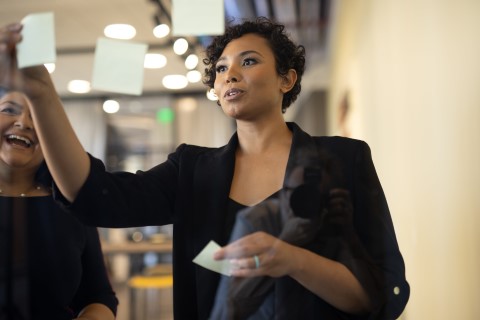Disrupting and improving education norms through learning sciences

“Many masters programs position students to enter into well-defined roles,” says Steven Zuiker, associate professor. Zuiker is the program coordinator for the Master of Arts in Learning Sciences program at ASU’s Mary Lou Fulton Teachers College, and is sharing how the program provides a unique pathway to success in the education field. “But learning sciences flips the script. It positions graduates to create leadership roles and change the way education happens, and offers tools to disrupt and improve the norm.”
Learning sciences, as a discipline, was developed a little over two decades ago, but based its curriculum around the much earlier established discipline of educational psychology, Zuiker says. While both disciplines focus on how to improve learning through a methodological approach, they vary greatly in their application of that approach.
Educational psychology is the marriage of education and psychology, and its goal is to improve the quality of curriculum so that it’s better absorbed and retained. It typically focuses exclusively on educational content and the minds perceiving it.
Learning sciences, on the other hand, is a collaborative approach to dissecting, analyzing and rebuilding the systems that influence learning. This means that instead of only looking at a variable or two, such as educational content and how it’s perceived, learning sciences examines all systems present within a learning environment and aims to optimize their functions.
For example, one of the primary systems present in most learning environments is the teacher-learner relationship. While examining this system, educational psychology would take an analytical approach and look at only the relationship between those two variables: it would assess how learners interpret and respond to a specific teaching style, and that would possibly be the end of the study.
In contrast, Zuiker says, learning sciences would take a design-based and holistic approach that wholly examines not only the relationship between the teacher and learner, but all other systems influencing the learning experience. It would assess how learners interpret and respond to a specific teaching style just as educational psychology would, but would also assess what types of conditions are being provided by the physical environment: are they conducive to learning for some, restrictive for many and distracting for others? The learning sciences approach would look at what set of circumstances before or after this learning instance might be influencing the present moment and would analyze the different experience and knowledge levels present among learners and seek to narrow that gap.
Overall, learning sciences is dedicated to analyzing the whole picture and inter-related influences in order to improve learning, says Zuiker.
Each course in the program focuses on real-world analysis and application of the theories conveyed through the curriculum, and students complete a culminating experience toward the end of their study. This experience is one in which students get a chance to partner with an organization in order to design and implement an insight, theory or experiment that they believe will help shape the future of learning.
The types of partnerships students create with organizations is primarily at the discretion of the student. Some students design a more formal partnership, in which they and the organization work together to develop a new policy, practice or organizational department, while other students create something more informal that might change shape as the partnership progresses.
For example, one student is working with a learning organization to help education leaders understand how to identity indicators of human trafficking, as well as how to intervene safely, and another student is contributing to the design of a new program within the Peace Corps. Each course of study is as unique as the individual completing it, says Zuiker.
Graduates often continue on from the program to fill interesting, unconventional roles within education. One recent graduate works on the education team at the Musical Instrument Museum in Phoenix, Ariz. She’s innovating the way patrons experience the museum’s exhibits, and her recent work was nominated for a Webby award.
“Our students already know the change they want to make,” says Zuiker. “We just want to give them strategies and tools to build the plane while they learn to fly it.”
To learn more about the Learning Sciences, MA, register now for an upcoming webinar.
View application deadlines here.